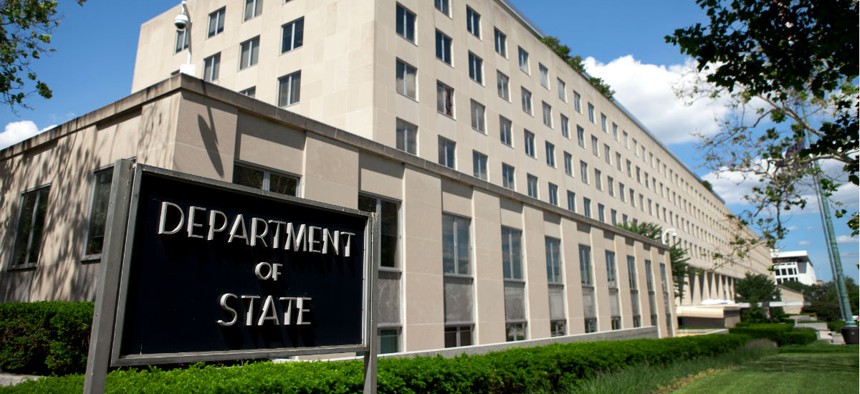
Mark Van Scyoc/Shutterstock.com
What the State Department Can Teach Agencies About Preparing New Appointees for the Job
The goal is to set people up for success.
We recently called for the new administration to revisit how political appointees are prepared for their new positions. We recommended that each cabinet department assume responsibility for onboarding their new appointees, and that agencies step up the activities undertaken between the nomination and confirmation as well as increase in the number of mechanisms for delivering vital information—briefings, seminars, training, site visits, etc.
The State Department has long been a leader in providing a variety of onboarding activities for new ambassadors. The department's Ambassadorial Seminar is a model for others to follow. The key characteristics of the seminar include:
- Participation is mandatory.
- A single entity (the Foreign Service Institute) has clear responsibility for undertaking the onboarding of new appointees.
- The department effectively uses the period between nomination and confirmation.
- The department does not rely on a single orientation event to prepare its political appointees, but instead provides a range of support.
State devotes significant resources and attention to onboarding. The goal is to set up new ambassadors for success. Such preparation does not start the day they walk into their new office, but rather many months prior to their swearing in and assumption of duties.
The three-week seminar—participation is required—is provided by the Foreign Service Institute for all incoming ambassadors. It is facilitated through the FSI Leadership and Management School and led by former ambassadors who serve as course mentors, along with FSI trainers. The seminar consists of a two-day preparation session for non-career candidates and three weeks of onboarding activities for both career and non-career nominees. (For more detailed information, see the The Onboarding of New Political Appointees by Lilith Christiansen, Paul Lawrence, Mark Stein, and Mark Abramson.)
Preparation. Prior to the three-week Ambassadorial Seminar, non-career candidates are encouraged to attend a two-day Non-Career Ambassadorial Seminar that is designed specifically for non-career nominees. The intent of this seminar is to provide information about department operations generally and U.S. embassies specifically. This helps nominees begin the Ambassadorial Seminar on a more level playing field with their career Foreign Service counterparts. Many candidates are new to the federal government, so this workshop helps address many of their basic questions. Candidates are encouraged to bring a list of questions and concerns.
Week One. The first week of the course is held offsite and facilitated by course mentors, FSI staff, and external contractors. Being out-of-town provides the opportunity to step away from the distractions of an office. The focus is on leadership—leadership skills, styles, and expected challenges. The offsite also provides the chance to build relationships among participants that can provide continued support once they are in the field. Learning happens both in a formal classroom setting and informally during meals.
Week Two. The second week takes place at department headquarters in Washington and focuses on policy and the specific roles, responsibilities, and authorities of the ambassador. The schedule is filled with guest speakers who hold some of the highest-level jobs within State (including the secretary of State, schedule permitting). Participants are briefed by selected principals with essential expertise and experience. Participants also receive a variety of short presentations from guest speakers on topics the departmental leadership team believes will be of interest to ambassadorial candidates. External speakers from the military and law enforcement community are often included to highlight the interagency culture. For many of the substantive topics presented during week two, participants may schedule a follow-up one-on-one consultation with the principal to get country-specific information.
Week Three. The third week of the seminar focuses on preparing candidate for success during the first 90 days. Participants prepare an entry strategy and plan for their first week and month, and they outline goals they want to accomplish during the first 90 days. Experienced public affairs trainers provide two days of public speaking and public affairs instruction. Additional speakers discuss pitfalls to avoid and the importance of security.
Next Steps
Departments should examine the Department of State Ambassadorial Seminar as a model from which they can build their own initiatives to fit the needs of their political appointees. A key element to replicate is that onboarding activities should be provided in the period between nomination and confirmation.
As demonstrated by State (and the private sector), a carefully developed and executed onboarding program increases the likelihood that political appointees will be successful.
Joseph Gurney leads the public sector practice and is senior vice president at Kaiser Associates, Inc. Paul R. Lawrence is vice president at Kaiser Associates, Inc. Mark A. Abramson is president of Leadership Inc.
Image via Mark Van Scyoc/Shutterstock.com.






